We’ve all been there: staring at the clock, counting down the minutes until the workday ends. Maybe you’re feeling undervalued, overwhelmed, or simply stuck in a rut. The question nags at you: “Is it time to move on?”
Quitting your job is a big decision, one that can fill you with both excitement and anxiety. On one hand, the thought of new opportunities and fresh challenges can be invigorating. On the other, the security of a steady paycheck and familiar routine is hard to let go of.
Whether you’re a recent graduate in your first “real” job or a seasoned professional contemplating a major career shift, knowing when to call it quits isn’t always clear-cut. It’s a deeply personal choice that depends on your unique circumstances, goals, and values.
6 Signs that You Are Ready to Quit Your Job for New Opportunities
Let’s explore some common signs that show it might be time to dust off your resume and venture into a new profession. We’ll also look at how to approach this decision thoughtfully, ensuring you’re making the right move for the right reasons.
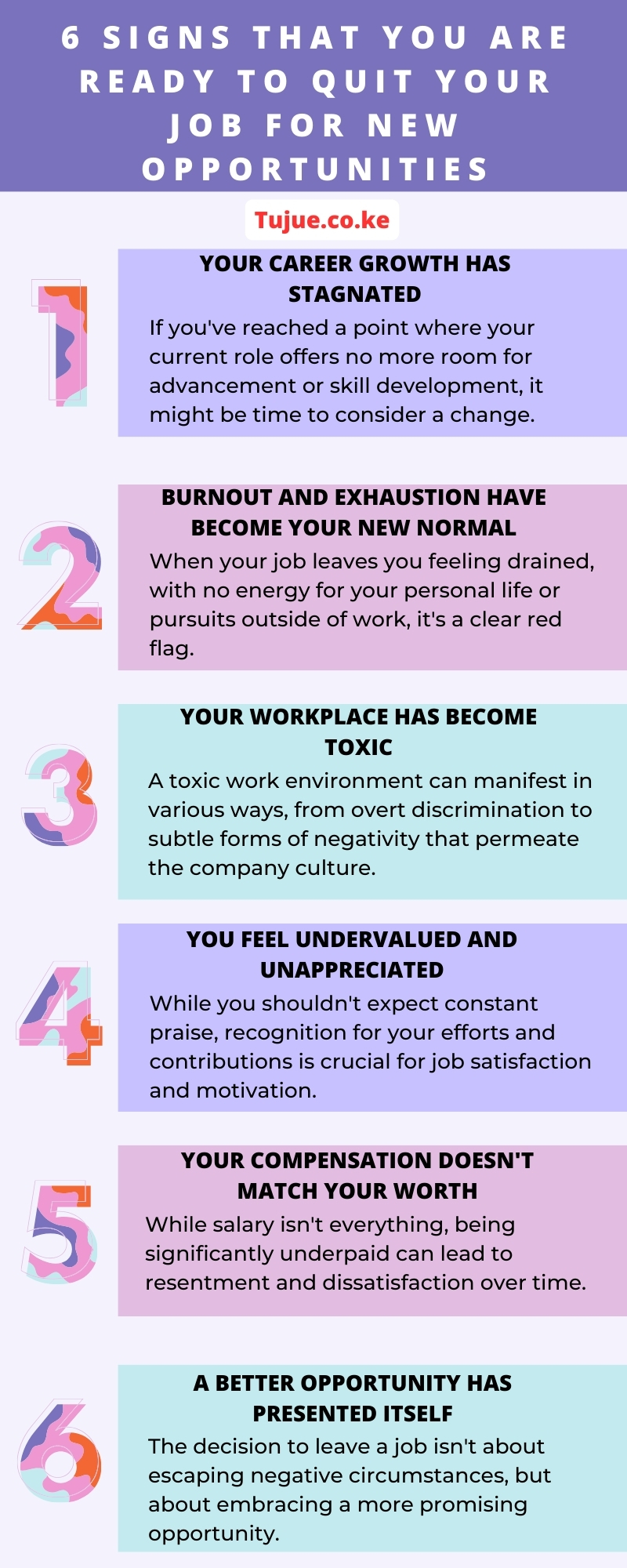
1. Your Career Growth Has Stagnated
Ever feel like you’re treading water professionally? If you’ve reached a point where your current role offers no more room for advancement or skill development, it might be time to consider a change. Career growth isn’t just about climbing the corporate ladder; it’s about continuous learning and expanding your capabilities.
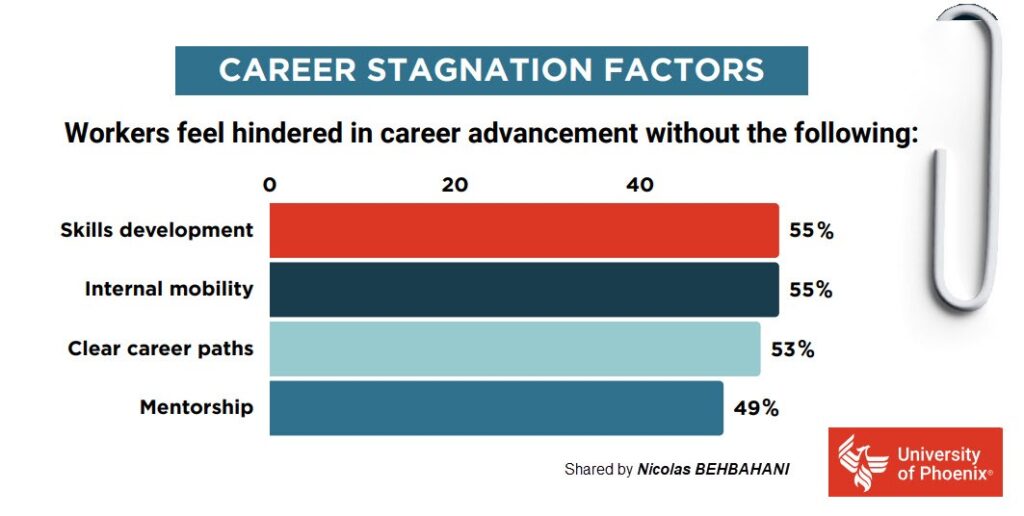
Credit: University of Phoenix
Look for these signs:
– You’ve mastered your current role and feel unchallenged
– There’s no clear path for promotion within your organization
– Your company lacks programs for professional development or upskilling
– You’re consistently passed over for new projects or responsibilities
According to the Founder and CEO of GrowthSchool, Vaibhav Sinsinty:
“Unsettling phase in one’s professional journey where, despite the initial excitement and momentum of a new job, there seems to be little to no progression in terms of skills, responsibilities or even pay. Think of it as being stuck in professional quicksand; you’re moving, but not really getting anywhere.”
2. Burnout and Exhaustion Have Become Your New Normal
When your job leaves you feeling drained, with no energy for your personal life or pursuits outside of work, it’s a clear red flag. Burnout is more than just feeling tired; it’s a state of physical, emotional, and mental exhaustion that can have serious consequences for your health and well-being.
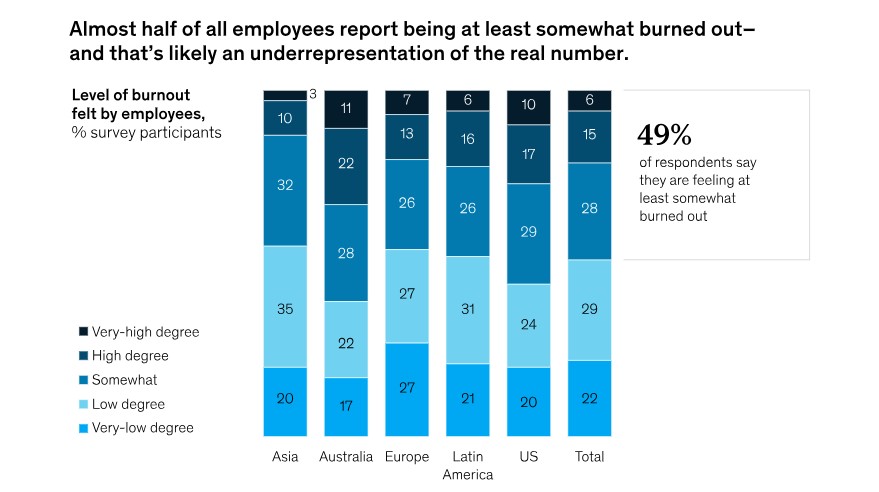
Credit: McKinsey
Consider these factors:
– You dread going to work most days
– You feel physically and emotionally depleted after work
– Your job stress is affecting your sleep, appetite, or relationships
– You’ve lost enthusiasm for tasks you once enjoyed
Recent statistics from Zippia reveal that a staggering 77% of employees have experienced burnout in their current jobs. This widespread issue underscores the importance of maintaining a healthy work-life balance. Remember, a fulfilling career should enhance your life, not consume it entirely.
3. Your Workplace Has Become Toxic
A toxic work environment can manifest in various ways, from overt discrimination to subtle forms of negativity that permeate the company culture.
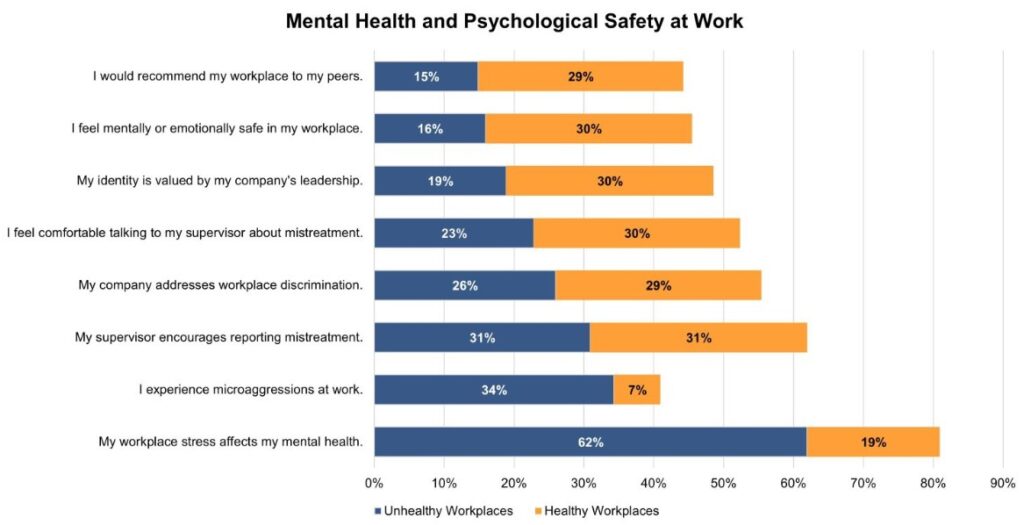
Credit: Mental Health America
The American Psychological Association reports that employees in toxic workplaces are more than three times as likely to experience mental health issues compared to those in healthy work environments (52% vs. 15%). This statistic highlights the significant impact workplace culture can have on your overall well-being.
Key indicators of a toxic workplace include:
– Rampant office gossip and cliquish behavior
– Lack of trust between colleagues or between employees and management
– High employee turnover rates
– Ineffective or indifferent leadership
– Discrimination or harassment (even if subtle)
According to Lisa Quinn, an executive and leadership coach
“I suspect most of us have experienced a toxic boss at one point or another….But in my experience, a toxic workplace goes beyond the behavior of one or two individuals—it’s systemic.”
4. You Feel Undervalued and Unappreciated
Feeling undervalued at work can be incredibly demoralizing. While you shouldn’t expect constant praise, recognition for your efforts and contributions is crucial for job satisfaction and motivation.
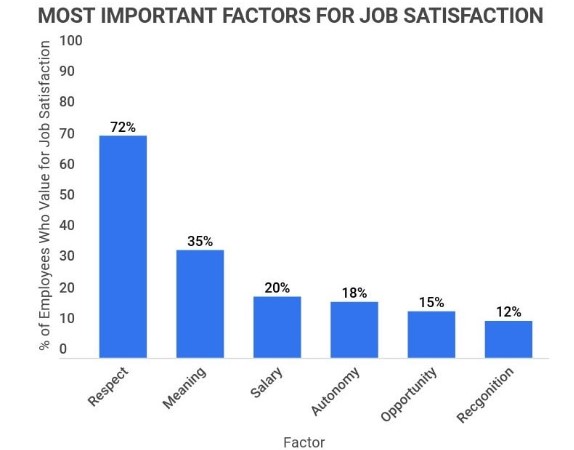
Credit: The New Workforce
When your hard work goes unnoticed or unacknowledged, it can lead to a sense of disconnect and diminished self-worth in your professional life.
Signs that you might be undervalued include:
– Inadequate compensation relative to your skills and experience
– Lack of positive feedback or acknowledgment of your achievements
– Frequent criticism without constructive guidance
– Being passed over for important projects or promotions
– Your ideas or suggestions are consistently ignored or dismissed
According the the author of How to be Happy at Work, Annie McKee
“There’s nothing worse than feeling unseen and unheard in the workplace…..We all have a human need to be appreciated for our efforts, and so when your colleagues don’t notice [your contributions], it makes you feel as though you don’t belong.”
5. Your Compensation Doesn’t Match Your Worth
While salary isn’t everything, being significantly underpaid can lead to resentment and dissatisfaction over time. According to recent statistics, 41% of the U.S. workforce believes they’re currently underpaid. This widespread sentiment highlights the importance of fair compensation in job satisfaction and retention.
Let us look at a case study conducted on video game workers:
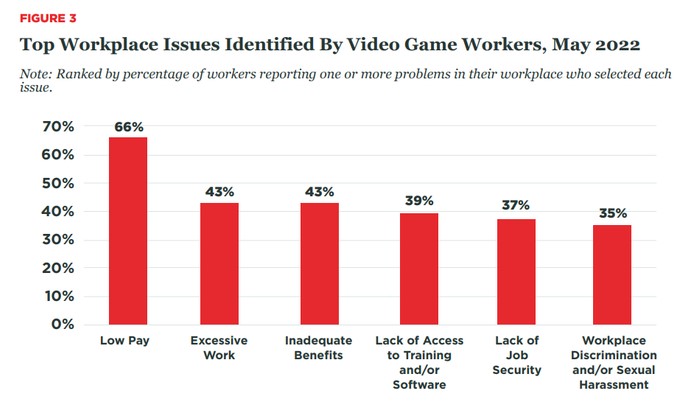
Credit: Game Developer
Consider these factors when evaluating your compensation:
– How does your salary compare to industry standards for your role and experience level?
– Are there additional benefits or perks that offset a lower base salary?
– Has your compensation kept pace with your increasing responsibilities and skills?
– Are there opportunities for salary growth within your current organization?
According to RB Consulting’s founder and executive coach, Racheal Bitte:
“The first step is to figure out what you’re worth by understanding average salaries for people in your role and those surrounding it.”
6. A Better Opportunity Has Presented Itself
Sometimes, the decision to leave a job isn’t about escaping negative circumstances, but about embracing a more promising opportunity. A “better” opportunity doesn’t always mean more money – it could offer improved work-life balance, greater alignment with your career goals, or a chance to work on more fulfilling projects.
When evaluating a new opportunity, consider:
– Career growth potential and learning opportunities
– Company culture and values alignment
– Work-life balance and flexibility
– Long-term career impact
– Compensation package (including benefits and perks)
– Job security and company stability
It’s crucial to thoroughly assess any new opportunity before making a decision. Avoid making hasty choices based solely on short-term gains. Consider how the new role fits into your broader career trajectory and personal goals.
What to do Before Quitting Your Job
If you’ve identified with any of the signs indicating it’s time to quit your job, consider taking these steps before making your final decision:
1. Attempt to Improve Your Current Situation
Before blaming external factors, the American Management Association recommends self-reflection. Ask yourself:
– What can I do to enhance my motivation?
– How can I improve my relationship with my supervisor?
– What actions can I take to positively impact my work environment?
Take an objective stance to analyze your role in the company and any conflicts you’re experiencing. If you’re still struggling after this self-assessment, it may be time to have a conversation with your employer.
2. Communicate with Your Supervisor
Schedule an in-person meeting with your supervisor. Prepare your talking points beforehand, which may include questions like:
– What growth opportunities exist in my current position?
– Are there other roles opening up that I could be considered for?
– Is there flexibility for remote work or adjusted schedules?
– How can I improve in my current role?
– What resources are available to help me develop professionally?
3. Define Your Ideal Job
Outline the characteristics of your dream job. Compare these to your current position. If you’re aiming for a higher-paying or more senior role, create a plan to achieve it. Research job listings in your field for inspiration and to understand market expectations.
4. Update Your Resume
Refresh your resume with your most recent work history, new skills, and accomplishments. Include any relevant conferences, training, or educational opportunities you’ve pursued. Consider having your resume professionally reviewed or taking a resume writing course to enhance your job prospects.
5. Build Your Savings
If you plan to quit before securing another job, start reducing expenses and building your savings. Even with a new job lined up, it may take time before you receive your first paycheck. Prepare financially for this transition period.
6. Resign Professionally
When you’re ready to quit:
– Maintain a positive attitude: Focus on the valuable experiences and skills you’ve gained.
– Provide adequate notice: Generally, two weeks’ notice is standard and allows time for transition.
– Inform your boss first: Schedule a private meeting to discuss your decision before making any formal announcements.
– Be respectful: Avoid burning bridges. Remember, you may need references from this employer in the future.
– Express gratitude: Thank your employer for the opportunities provided, even if you’re leaving due to challenging circumstances.
Good Luck!
Deciding to leave a job is not easy. It’s a decision that requires careful consideration, self-reflection, and often a leap of faith. As we’ve explored, there are many valid reasons to consider moving on – from stagnant growth and burnout to toxic environments and better opportunities elsewhere.
Remember, there’s no one-size-fits-all answer to when it’s time to quit. Your career journey is uniquely yours, shaped by your goals, values, and circumstances. What’s right for one person may not be right for another.
If you do decide it’s time for a change, approach it with professionalism and purpose. Plan your exit strategy, secure your next opportunity if possible, and leave on good terms. Your reputation is a valuable asset in your career, so nurture it even as you move on.

